by Paul Cudenec
4. Fake “lessons from history”
6. Case study: Macronist France

1. The rule of money
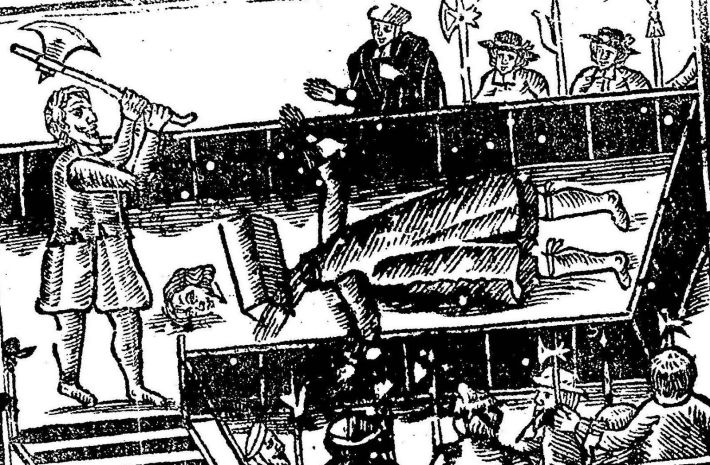
The spring of 1649 was a time of unprecedented hope for the people of England. Civil war had turned to revolution, King Charles I had lost his head and a republic had been declared.
The victorious “roundhead” parliamentary army which had defeated the royalist “cavaliers” was heavily imbued with the radical ideas of the Levellers and at St George’s Hill in Surrey a little group of rural rebels were setting out to reclaim the land as a “common treasury for all”. (1)
But the hope did not last and the moment turned out to be the high water mark of popular revolt. The agitators of the New Model Army were crushed at Burford by Oliver Cromwell’s cronies, the Diggers were attacked and evicted from their squatted land and “law and order” were restored. Eventually, of course, the monarchy came back as well, albeit in “constitutional” guise.
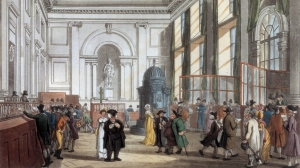
Instead of becoming a country of free men and women, growing their own food and deciding their own destinies, England became the birthplace of liberal capitalism.
The tyranny of privilege maintained by the old Stuart regime had not been ended, simply transferred into new hands.
Popular anger against feudal hierarchy had been harnessed by the entrepreneurial and banking classes to get rid of all those inconvenient old-fashioned barriers to trade and money-making.
Once the people had played their revolutionary role, and the old regime was gone, they became the enemy within and had to quickly be put back in their place before things went too far.
The essence of this commercial coup d’état is nicely symbolised by the fact that a lavish feast was laid on for Cromwell by the City of London to celebrate his crushing of the radicals at Burford. (2)
By the first decades of the next century, Merrie England had already been replaced by the kind of society that is all too familiar today.
Writes Christopher Hill, referring specifically to 1714: “We are already in the modern world – the world of banks and cheques, budgets, the stock exchange, the periodical press, coffee-houses, clubs, coffins, microscopes, shorthand, actresses, and umbrellas. It is a world in which governments put first the promotion of production”. (3)
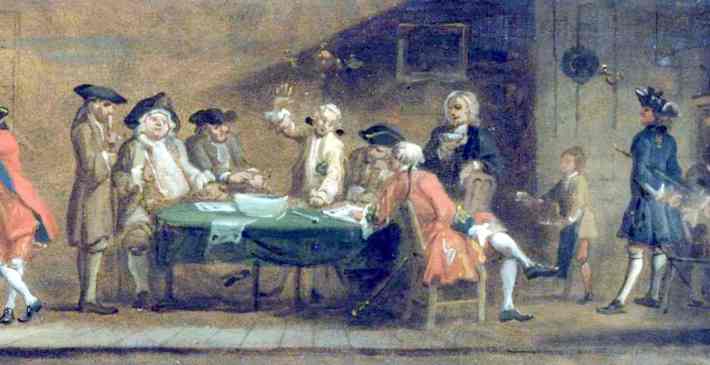
This new modern world was, of course, thoroughly commercial. It was the Gesellschaft which Ferdinand Tönnies identifies as having replaced the Gemeinschaft, or community, of earlier ages. It meant, in his words, “the ascendancy of greed for money, ambition and lust for pleasure”. (4)
As Georges Lapierre says, this commercial spirit came to dominate not only the social and economic life of the Western world, but also the inner worlds of its populations: “In a mercantile society we are all merchants, our heads are filled with the thoughts of big capitalist merchants, we all think about money”. (5)

The modern Gesellschaft was also expansionist and imperialist, driven by an insatiable hunger for new “markets”, more “growth”, greater profits.
It is no coincidence that English expansionism, long held back by the reluctance of the Stuart monarchy, took a great leap forward under Cromwell’s republic, with the acquisition of Jamaica, St Helena, Surinam, Novia Scotia and New Brunswick.
This imperialism, like the suppression of popular revolt at home, was not carried out by means of the magical workings of the capitalist “free market”, but by brute force.
Lapierre cites the example of Australia, where “the Aborigines had to submit to the idea of exchange held by the British colonists, or else disappear: massacres, deportations, reserves or concentration camps; the indigenous people and their way of seeing the world do not interest the British colonists, they are wiped out or fenced in”. (6)
Again and again, says Lapierre, “absolute violence” had been used to impose the rule of money: “Violence is at the heart of capitalism. To submit to the capitalist system, consciously or not, is always to do violence to yourself”. (7)
2. Liberalism as deception
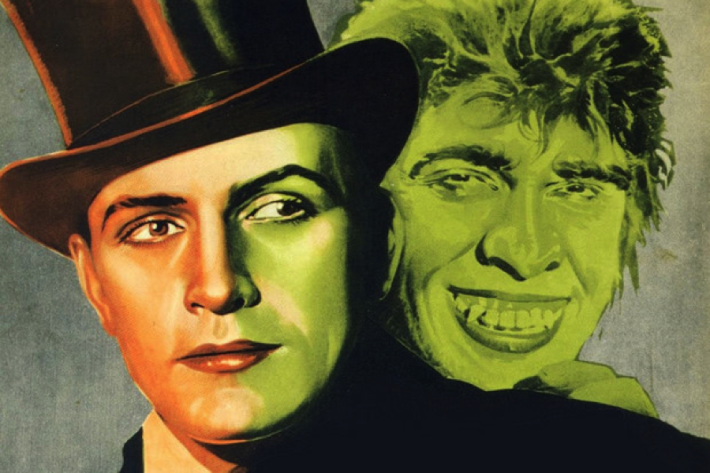
At this point, the reader might begin to wonder what all this has got to with liberalism. Liberalism, after all, is supposed to be all about liberty and human rights, not violence and enslavement.
The answer is that, as Ishay Landa points out in some detail in an excellent 2012 study, (8) there are two faces to liberalism.
On the one side there is political liberalism, which favours individual freedom and an open and democratic society. And on the other side there is economic liberalism, which is just capitalism.
The trouble is that these aspects are not really compatible. When liberalism is battling against a feudal regime, it does seem to represent the cause of the people, as a whole, against a ruling elite.
But once it has achieved that goal and holds the reins of power, the limits of this political liberalism quickly become apparent. The law, which it once used as a weapon to fight entrenched injustice, suddenly becomes “law and order”, a tool for the defence of the liberal status quo.

Democracy, which seemed like such a good idea at the time, is now seen as a threat, a means by which “the masses” might interfere with the wealth and privilege of the mercantile classes.
Therefore, whenever economic liberalism finds itself under threat from “populism”, it quickly jettisons the principles of political liberalism to which it is theoretically tied.
In other words, these “principles” are not principles at all, just convenient postures designed to cloak the unpleasant reality of the economic liberals’ capitalist system.
We might even define liberalism as being the deception maintained by capitalism to hide its true nature.
This deception, this “egoism, impudence, falsehood, and cunning” (9) as Tönnies put it, can be seen lurking behind all the mainstays of liberalism.
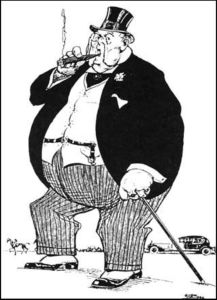
Property. This is the bedrock of liberal ideology on which its notion of individual “freedom” depends. Liberalism will not entertain the thought that the property of one individual amounts to a theft from the communal whole and will always justify and deploy the use of state violence to protect property. Its “freedom” is therefore fake, being merely the “freedom” of a minority to benefit at the expense of the majority. Furthermore, liberalism betrays its own supposed commitment to freedom of expression and debate by enshrining the sacredness of property in its laws and constitutions in such a way as to remove the very issue from the realm of possible political debate.
The Economy. This familiar term is, in itself, aimed at deceiving. Most people will assume that it merely refers to the everyday practical functioning of society in a vaguely-imagined general public interest. A threat to “The Economy” is always presented as bad news for all of us. In fact, of course, it refers to the capitalist economy, which is a mechanism by which the rich minority exploits the majority. Again, liberalism deceives the public by pretending that its interests and ours are one and the same, whereas they are usually diametrically opposed.

Work. The work ethic is at the heart of liberalism. When directed at “the masses” this is an order to keep slaving away to make profits for the liberal bosses. But when applied to the bosses themselves, it is used to explain the wealth they have accumulated by exploiting their workforce and the natural world. These people have “succeeded” because they have “worked so hard” and there can be nothing immoral about this, liberals are keen to tell us.
Progress. This is a key word in the liberal vocabulary and nicely reflects the two-faced nature of the creed. It is used, at the same time, to describe the advance of industrial capitalism (economic liberalism) and also to describe the gaining of certain human rights and individual liberties (political liberalism). The liberals’ trick is to conflate these two very different concepts into one and the same, deceiving those “progressives” who support the latter into imagining that it inevitably goes hand in hand with the former. This is evidently not the case, especially since, as we have seen, the “liberties” offered by political liberalism are illusory and will always be secondary to the maintenance of economic liberalism and its capitalist system.
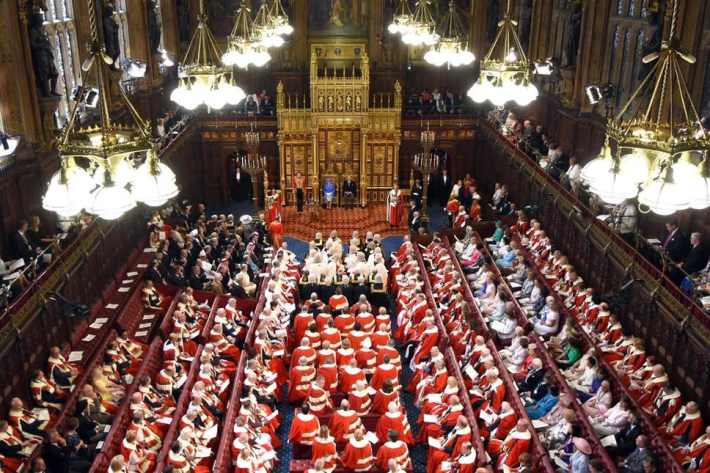
Democracy. Ever since the victory of “Parliament” over the monarchy in the English Revolution, liberals have claimed to champion democracy. But their sense of democracy is very limited as it must always be balanced by their need to protect “property” and “The Economy”. The representative parliamentary party-political system has therefore been carefully manufactured and fine-tuned to ensure control remains in “safe” hands, namely in those of the wealthy elite. The gulf between the liberal fantasy of “democracy” and actual reality is so wide that many see through the lie, and the liberal system is forced to constantly deploy a wide variety of propaganda techniques to keep its flimsy illusion intact.

Niceness. Liberalism always claims to be motivated by the very best intentions. When it takes away our rights and freedoms, it reassures us that this is for our own “protection”. When its armies invade people’s lands, it is “liberating” them. When it destroys their cultures and communities it is “civilising” or “modernising” them. Its enemies are always despicable dictators, its wars are always “unavoidable”, the death it deals out is mere collateral damage in its invariably “humanitarian” missions against all the evils to which it is diametrically opposed simply by virtue of its liberal nature. Its imperial armed forces are its “defence” and its death-dealing arms-dealers are part of a crucial “defence industry” that not only keeps “us” safe but creates “jobs” and is very good for “The Economy”.
Normality. The idea that liberal capitalism is a natural state of affairs, the inevitable outcome of “progress”, is one of the main planks of the system’s mendacious narrative. From the reassuring framing of “the news” and social reality by the capitalist media to the sneering contempt for “extremists”, “populists” or “lefties”, the message is always that “There Is No Alternative”, that the capitalist world is “the real world” and any other version is not only undesirable but, in fact, impossible.
3. Liberalism and fascism
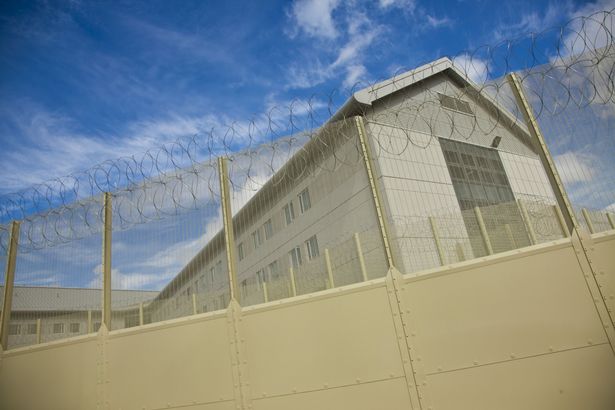
If one pillar of liberalism is deceit, the other is the inherent violence of the capitalist system, which this deceit serves to conceal.
This violence is deeply embedded in the system. There is violence in the fact that we are excluded from living freely on and from the land; there is violence in the way that refusal to take part in the capitalist system risks leading to homelessness, hunger and early death; there is violence in the imposition of the system’s laws, whether this is carried out by a bailiff, a cop, a judge or a prison warden.
Sometimes this violence does not even have to be real. It is the threat of violence which imposes the system’s will and control. But this threat is still violence, in the same way that it is violence to hold a knife at someone’s throat to force them to act in a certain way.
When things are going well for capitalist society, economic liberals can put on the mask of political liberalism and pretend that they are absolutely committed to “freedom and democracy”.
But when their power is under threat, they are forced to qualify such commitment with talk of emergencies and crises and very quickly withdraw the “rights” they were so proud to hand out to the population.

Usually, a brief period of repression will be enough to restore liberal order and they can then go back to showing their other, smiley, face. But sometimes faith in their system has been so eroded, and the threat of radical change or even revolution so great, that liberalism is forced to take on an even more severe form.
This is, roughly, the argument made by Ishay Landa in his book The Apprentice’s Sorcerer: Liberal Tradition and Fascism. As the title hints, Landa regards fascism as being a continuation and adaptation of liberalism.
He writes: “Far from being the antithesis of fascism, an absolute Other, the liberal order significantly contributed to fascism, informing many of its far reaching manifestations… Fascism was an organic product of developments largely (that is to say: not entirely) from within liberal society and ideology. It was an extreme attempt at solving the crisis of liberalism, breaking out of its aporia, and saving the bourgeoisie from itself”. (10)

If fascists were (and are) often critical of liberalism, he explains, it was not on account of its economics, its capitalism. It was, rather, the nice face of liberalism, the political liberalism of human rights and democratic liberties, which irritated them. The fascists’ main criticism was that liberalism was too nice, too weak, too eroded by its own “democratic” posturing, to effectively see off the threat posed by “the masses”, by socialism, communism or anarchism, to the status quo.
Landa marshals an impressive range of voices from the liberal and fascist traditions to demonstrate just how much they have in common.
He points, for example, to the 17th century English liberal philosopher John Locke, who justified the use of violence to protect sacrosanct “property”, endorsed child labour from the age of three, wished to criminalise beggars and vagabonds and wrote of the need to bring the masses to “obedience”, adding: “The greatest part cannot know, and therefore they must believe”. (11)
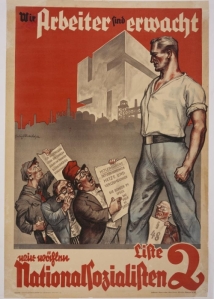
Landa also examines the work of Vilfredo Pareto (1848-1923), a liberal economist who had an enormous influence on Benito Mussolini and on Italian Fascism in general. Pareto was committed to an unfettered capitalism, arguing that market forces arose from the “strength of life”. (12)
The notion that there was something socialist about fascism can be traced back to the fascists themselves, notably with the term “national socialism”.
But the fascists, like the liberals, had no qualms about using deceit to advance their cause and Landa argues that their “socialism” was deliberately misleading from the very start, a kind of “redwashing” or branding of their pro-capitalist agenda to make it acceptable to the public and, at the same time, to undermine genuine socialism.
He notes: “Capitalism had scarce little popular appeal after the First World War and amidst protracted world economic crisis. A much better prospect for supporters of capitalism lay in feigning to embrace socialism, so as to infiltrate it inside an ideological and political Trojan horse and defeat it from within”. (13)
Today’s received wisdom that there was something “anti-capitalist” about historical fascism is false, and swallows fascist propaganda at face value.

Nazism in power was right-wing, extremely right-wing! It was so far from being socialist or anti-capitalist that it won the support of some of the most prominent German industrialists, such as Alfred and Gustav Krupp, Kurt Schröder, Frantz Thyssen and Albert Vögler (14) and had good relationships with the likes of IBM and Coca-Cola.
The mere fact of state intervention in the economy is no indicator of socialistic intent, says Landa. The important question that we need to ask is “on whose side and for whose benefit did the fascists intervene in the economy?” (15)
The answer is that they did so for the benefit of the capitalists. As historian John Weiss notes: “Hitler used tax relief policies, for example, to push production by heavy industry to a maximum”. (16)
This was not a state intervention from the left, but from the right, stresses Landa, intended “to boost the economic and political interests of capitalism”. (17)
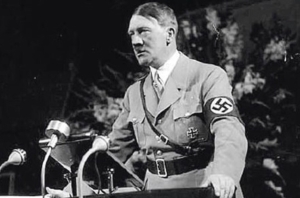
Adolf Hitler was a great enthusiast for private property and free enterprise. He regarded economic competition between individuals, the “play of free forces”, as being essential for a nation’s health. Only this way could the “aristocratic principle of nature” assure that the fittest persons, “superior individuals”, would prevail. (18)
And, like other economic liberals, the Nazi dictator believed that political liberalism had to be ditched in order to allow capitalism to maintain control, declaring in a speech to industrialists: “It is impossible to sustain market-economy in a period of democracy”. (19)
Hitler’s warmongering economic expansionism was greatly inspired by the example of the liberal-capitalist British Empire. He enthused in Mein Kampf: “No nation has more carefully prepared its economic conquest with the sword with greater brutality and defended it later on more ruthlessly than the British…. England always possessed the armament that she needed. She always fought with the weapons that were required for success”. (20)
He praised Britain for the “great work-camps for all sorts of parasites” (21) it had built in South Africa and later, of course, made his own deadly use of the model.
Concludes Landa: “Rather than seeing Hitler’s system as a departure from the way of the West, it makes more sense to conceive of Nazism as a fanatic, die-hard attempt to pursue the logic of Western 19th century capitalism to its utmost conclusion, to go all the way, rejecting the contemptuous compromises of the bourgeoisie with socialism”. (22)
4. Fake “lessons from history”

After the defeat of historical fascism, the baton of The Big Lie was passed back into the hands of mainstream liberalism.
Post-war liberalism was, of course, happy to use the modern sophisticated propaganda techniques developed by fascism for its own purposes, not least in commercial advertising campaigns.
But it went a step further by using the example of fascism, and indeed the lies propagated by fascism about its own agenda, as additional weapons in its endless war to conceal the truth about capitalist “democracy” and to vilify opponents of its system.
Some liberals have been candid enough to acknowledge that fascism in fact sought to defend the economic system, the “civilization”, to which they are themselves committed.
Ludwig von Mises, for instance, wrote: “It cannot be denied that Fascism and similar movements aiming at the establishment of dictatorships are full of the best intentions and that their intervention has, for the moment, saved European civilization. The merit that Fascism has thereby won for itself will live on eternally for history. But… fascism was an emergency makeshift. To view it as something more would be a fatal error”. (23)

Another liberal, F.A. Hayek, was expressing much the same sentiment when he declared in a press interview in Chile: “Personally I prefer a liberal dictator to democratic government lacking liberalism”. (24)
However, in general, the strong connection between economic liberalism and fascism has been carefully concealed from public view and the lies which fascism told about itself have been recycled and served up again to the public in order to repackage its historical significance according to the requirements of the liberal system.
Landa explains: “Following the debacle of European fascism, its liberal pedigree became a source of embarrassment. The need, on the part of intellectuals endorsing the liberal order, was to absolve liberalism of any historical complicity with fascism, by delineating an alternative genealogy, that would construe fascism as a non-liberal or even anti-liberal force”. (25)

The aim of these intellectuals was “to conflate Nazism and Communism as the twin evils of ‘totalitarianism’, equally the foes of the liberal West”, says Landa. (26)
The fascists’ ideological belief in competition, property, entrepreneurship and their crushing of the trade unions at the behest of the capitalist bosses was all consigned to the Orwellian memory hole: “Nothing of that was allowed to confuse and deter the reader from seeing liberalism as a defenseless victim of fascist aggression”. (27)
Indeed, says Landa, several historians took fascism’s own propaganda at face value by accepting that it was “neither right nor left” and “in fact in its original impulse much more indebted to the left“. (28)
Fascism has even been presented as the result of “too much” democracy, that is to say the bad, “populist”, kind of democracy which overspills the safe limits placed around it by sensible liberalism.
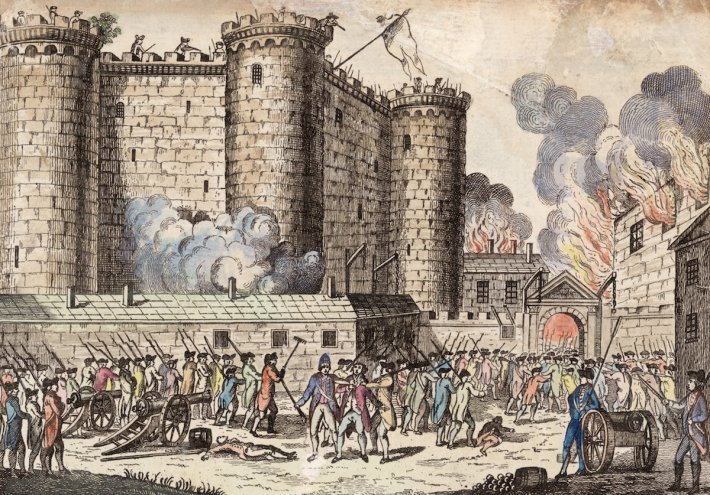
Historian George Mosse, for instance, has insisted, incredibly enough, that “the French Revolution stood at the beginning of a democratization of politics which climaxed in twentieth-century fascism”. (29)
Comments Landa: “Between the lines, at least, there is a lesson implied in such readings of history: if democracy we must have, then let us take care that it be influenced as little as possible by the masses, and guided as far as possible by wise and responsible people. The best remedy to the pitfalls of democracy involves the curbing of its populist dimension, the guaranteeing of a democracy of quality standing on a solid liberal base rather than a shaky populist one”. (30)
In other words, the grim heritage of fascism, a movement which evolved as a response to the threat of democracy, is transformed into a warning from history of the dangers of allowing democracy to go too far… Again we observe the sophisticated forms of deception which are inherent to liberalism.
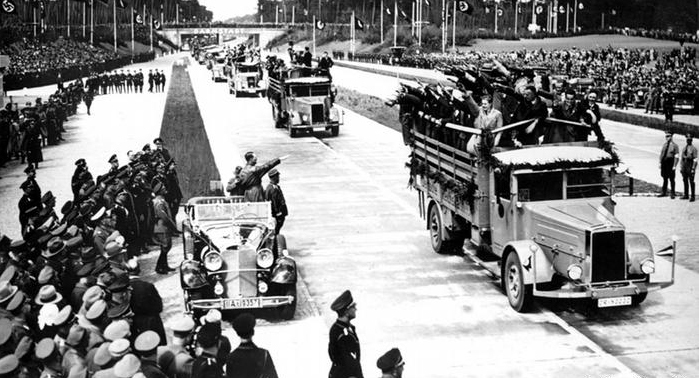
We see exactly the same process in play regarding fascism’s supposed links to nature-based philosophy. The lies told by the Nazis when selling their particular brand of industrial capitalism to nature-loving German voters are dusted off and wheeled out again decades later.
This time they are used to discredit and disqualify deep green and organic political ideas by linking them to fascism.
Janet Biehl and Peter Staudenmaier, for instance, have used the construct of a Nazi ideology supposedly based on “nature mysticism”, “a return to the land” and “organicist holism” to point accusingly at “a chilling currency within contemporary ecological discourse”. (31)
But while Nazi rhetoric and ideology were partly shaped by such ideas, they were forced to distort them beyond recognition to make them compatible with their own racist, statist, industrial and hierarchical politics.
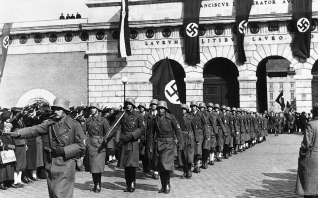
Their supposed love of nature was as fake as their socialism and Hitler openly scoffed at those who took an interest in the idea of an organic community, or Gemeinschaft, from below.
From the fascist perspective, community was impossible without the state and its police, “for it was through force alone that community was created and preserved”, he insisted. (32)
Individual supporters who naively took green or holistic ideas seriously were quickly pushed aside as the real Nazism prevailed: it was all about efficiency and Technik, industrial growth and the machine-state.
For an in-depth exploration of this issue, we refer readers to the 2018 article ‘Bringing down the fascist machine‘. (33)
The important point to note is that the Nazis’ lies about their own movement have been kept alive and used again in a different context.
First time around, they served to disguise the industrial capitalist agenda behind fascism by using a facade of socialism and love of nature.
Second time around, they are being used to protect industrial capitalism from its radical critics by using a “fascist” smear based on the fascists’ own facade!
5. A spectacle of lies
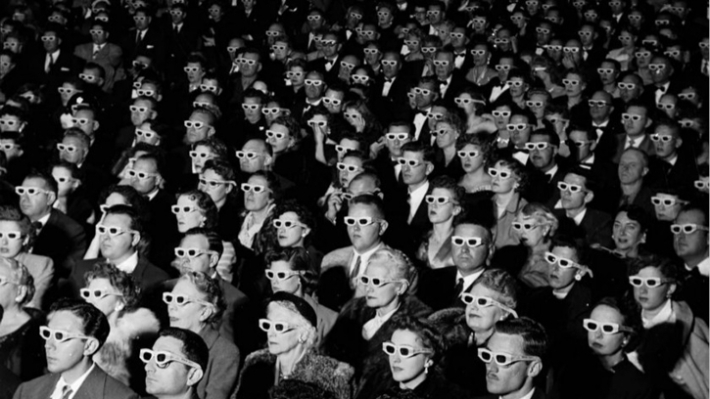
Western liberal society since the Second World War has generally plunged deeper than ever into deceit.
After 1945, liberal capitalism focused its efforts on opposing Soviet communism and the threat posed by anti-capitalism. And in doing so, it did not hesitate to immediately renew its anti-left alliance with fascism!
For instance, when the US and UK set up the anti-communist “stay-behind” Gladio network in 1945, they were quick to recruit former Nazis including “Butcher of Lyon” Klaus Barbie and Hitler’s spy chief Reinhard Gehlen.
Fascist veterans of the Spanish Civil War, militants from Mussolini’s last-stand Salo republic and other right-wing extremists were also welcomed on board. (34)

As well as using Nazi personnel (notably scientists) to build the post-war West, the liberal-capitalist system also adapted other fascist techniques for its own purposes.
The Allies’ wartime propaganda, deceitful enough to inspire George Orwell to base his Ministry of Truth on his experiences at the BBC in London, continued into the Cold War and co-opted the myth-making Nazi style of propaganda to paint capitalism as “the free world” bravely defending freedom and democracy.
The scope, scale and sophistication of this capitalist propaganda, merging corporate and state interests, was such that it became increasingly difficult to deconstruct and understand.
There were so many layers of blatant deceit, so many false assumptions and outrageous distortions, that modern liberal society came across as one huge lie.
Guy Debord, writing in 1967, described this contemporary liberal-capitalist world as the spectacle, “the superficial reign of images”. (35) He wrote: “The spectacle is the moment when the commodity has achieved the total occupation of social life”. (36)

It was enormously difficult to break out of this capitalist mind-prison, because opposition to its basic premises could not be adequately expressed and communicated through the language it made available in its culture.
Debord explained, in a 1992 follow-up to his original book, that even a critic of the spectacle was forced to speak its language, “for it is the only one he is familiar with; the one in which he learned to speak. No doubt he would like to be regarded as an enemy of its rhetoric; but he will use its syntax. This is one of the most important aspects of spectacular domination’s success”. (37)
There is a clear parallel here with the words of Orwell’s fictional apologist for the Big Brother spectacle who boasts: “Don’t you see that the whole aim of Newspeak is to narrow the range of thought? In the end we shall make thought-crime literally impossible, because there will be no words in which to express it”. (38)
The fact that Orwell was depicting an imaginary totalitarian society, while Debord was describing a very real liberal capitalist one, hints at the way in which fascism and liberalism gradually reconverged in the decades following the Second World War.

We have already described how liberalism was built on deceit, how its key concepts like “progress” and “democracy” are there to cloak its real nature.
We have also seen how it has used a fake interpretation of fascism, initially created by fascists, to discredit anti-fascist criticism of liberal capitalism.
It is worth mentioning a few more contemporary examples of the sophisticated fibbing which lies at the heart of liberal rule.
Narrative control. The spectacle normally likes to keep up the appearance of being “open” and “democratic”, so tends to avoid actually banning or overtly controlling sources of news and information. Behind the scenes, however, everything is tightly sewn up. This has long been the case with journalism, publishing and academia, but the information-control process took a big step forward with the development of Wikipedia. Ostensibly a “an open collaboration project by a community of volunteer editors”, and containing vast amounts of genuinely useful information, this is constantly policed, censored and altered by agents of the system (in a cleverly concealed way, in keeping with standard liberal practice) so as to lower the reputation of its enemies and enhance that of its supporters. The “Philip Cross” controversy is very illuminating in this respect. (39)

Strategic character assassination. If a liberal system does not want to expose its authoritarian nature, it cannot be seen to unfairly persecute its political enemies. It therefore prepares the ground for any such attacks by smearing their reputation, particularly among those who might be expected to rally to the defence of the victim. The prime contemporary example of this is the case of Wikileaks founder Julian Assange. As Nils Melzer, UN Special Rapporteur on Torture pointed out in a German TV documentary: “Of course it is much easier to make an example of someone and to violate all their human rights when it is a person nobody likes…. we absorb it all through the media”. (40)
False labelling. Unlike overt authoritarians or fascists, ostensibly freedom-loving liberals cannot be honest about their reasons for victimising or vilifying opponents. They will not publicly condemn opponents of imperialist wars as “traitors” or “reds” or “the enemy within”, even though that may be the thinking behind closed doors. Instead imperialist liberals will try to give themselves the moral high ground and even place themselves to the “left” of their critics by labelling them apologists for foreign states which they have already packaged as “bad” or “evil”.
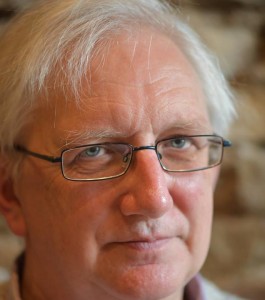
Thus anti-war dissidents become “apologists for Putin”, “Assadists” or “campists”. This approach even extends to the judicial realm, with Assange magically transformed from being a whistleblower exposing war crimes (whom liberals ought theoretically to support) into being a practitioner of alleged “espionage”. The hypocrisy in his case is so blatant that it risks permanently damaging the system’s precious illusions. Melzer commented: “If investigative journalism is classified as espionage and can be incriminated around the world, then censorship and tyranny will follow. A murderous system is being created before our very eyes”. (41) And Craig Murray added: “If a single day at Woolwich Crown Court does not convince you the existence of liberal democracy is now a lie, then your mind must be very closed indeed”. (42)
“Anti-semitism”. A recent development in false labelling has been the massive extension of the term “anti-semitism”. Not only has this been misused (43) to criminalise criticism of the Israeli state and to silence Palestinian voices, but it has also been deployed to disallow anti-capitalism, on the absurd basis that an anti-capitalist condemnation of the “one per cent” of the rich elite is somehow inevitably a disguised attack on the Jewish minority. If you talk about bankers and financiers running the world, controlling the media, and cheerleading for war, it is argued, you are really blaming Jewish people or, at the very least, falling into the hands of those who do. (44) As Daniel Finn crucially pointed out in a 2018 article in Jacobin magazine, insinuations of anti-semitism can thus be used, not merely to defame critics of Israel, but “to discredit any radical critique of capitalism or imperialism in the modern world”. (45)

Note that the cleverness of this kind of liberal smearing involves the contamination of the target by means of the accusation alone. Any attempt to dispute the grounds on which this accusation is made will be deliberately interpreted as belittling the significance of the original, and very real, problem. Someone who says the application of “anti-semitism” to anti-capitalism is exaggerated will be treated as if they had said that the threat of anti-semitism as a whole was exaggerated. In the same way, someone who challenges the misuse of climate change concerns to promote a capitalist agenda risks being accused of “climate denial”. Criticism of the capitalist system is ruthlessly shut down, using the gaslighting language of liberalism to paint the victims of its sly censorship as the actual “offenders”.
“Conspiracy theories”. The favourite liberal put-down of anyone investigating the crimes and deceit of its system is to dismiss them as a “conspiracy theorist”. The approach was pioneered in the US by Richard Hofstadter in the 1960s (46) and has been used with great success by the liberal system to contaminate and discredit exposure of its crimes. The automatic cry of “conspiracy theorist!” now appears to have dispelled, even in “social justice” (47) or “anarchist” (48) circles, any need to actually read and assess the information involved. The work of researching, collating and presenting detailed and sourced information exposing wrongdoing by the rich and powerful seems today to be regarded by some so-called radicals as, in itself, reprehensible and dangerous. Needless to say, any suggestion that this conditioned response is itself part of a process of manipulation and control will be regarded as further confirmation of the original thought-crime!

Fake dissidents. The biggest lie peddled by the liberal system is that it is democratic, whereas it in fact only tolerates a “democracy” which keeps its structures of control and exploitation intact. Because it has the unlimited resources of the capitalist system at its disposal, and has built structures to hide its activities from public scrutiny, it can allow itself to flood everywhere and everything with its representatives, even milieux that are ostensibly hostile to its politics. It makes little difference whether the individuals concerned are paid directly by the state-corporate complex or indirectly via compromised organisations (including by outside funding), or indeed whether they work for free, having been duped by compromised structures into promoting the system’s views. The bottom line is that the world of “dissent” or “opposition” is riddled with people ultimately acting on behalf of the liberal-capitalist system.
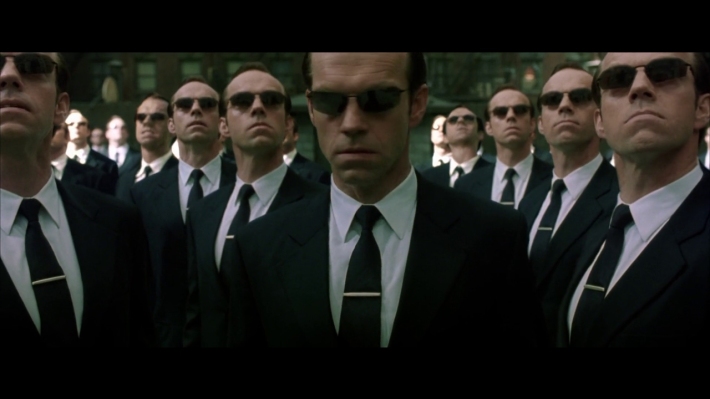
There are no end of fake-left and fake-green journalists and organisers working within a mutually self-reinforcing network of NGOs, campaign groups, publishing houses and other sundry ventures. Where independent groups opposing the system do exist, they are often quickly infiltrated and taken over. Political parties and movements are, needless to say, heavily targeted to ensure there are no nasty outbreaks of real democracy. The ongoing Spycops (49) scandal in the UK has revealed that British police infiltrated more than 1,000 groups in recent decades. But the issue goes much deeper (into territory declared “out of bounds” by the “conspiracy theory” narrative constructed by the system itself!). State agents in political movements are not just there to monitor activity, but to channel it in directions favourable to the system’s interests. Sometimes this might mean simply steering groups away from challenging the core of capitalist power. At other times people can be manipulated into actively promoting capitalist interests – as with the system’s attempt to use the climate movement to launch its “Fourth Industrial Revolution” reboot of the capitalist economy. For more on this see the extensive online Climate Capitalists library. (50)
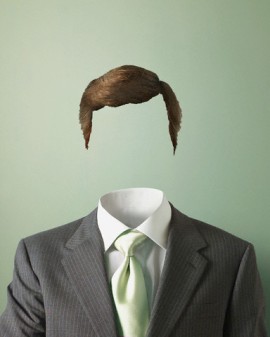
“Beyond politics”. Liberals like to present themselves as being “moderate” and so close to “the centre” that they are essentially non-political – or “beyond politics” as some like to put it. (51) They paper over the cracks in their exploitative capitalist society by claiming “we are all in it together” and urge us to cast aside divisive ideology that disturbs the social peace. But “professing no ideology is an ideology in itself”, as Robin Ramsay has remarked. (52) The ideology of being “non-political” reinforces the liberal narrative that their capitalist system represents normality, that there is no need for deep analysis that might lead to radical change in the system, merely the obligation to moderately manage it and tweak it as necessary to ensure its continuation. When they need a vague impression of “radicality” to spice up their tired political line, or to disguise its evolution into a more hardline neoliberal form, they market their supposed “novelty”. This repackaging of the same old capitalism as something “new” worked splendidly for Tony Blair in 1997 and Emmanuel Macron in 2017 but not at all for Change UK in 2019. (53)
6. Case study: Macronist France
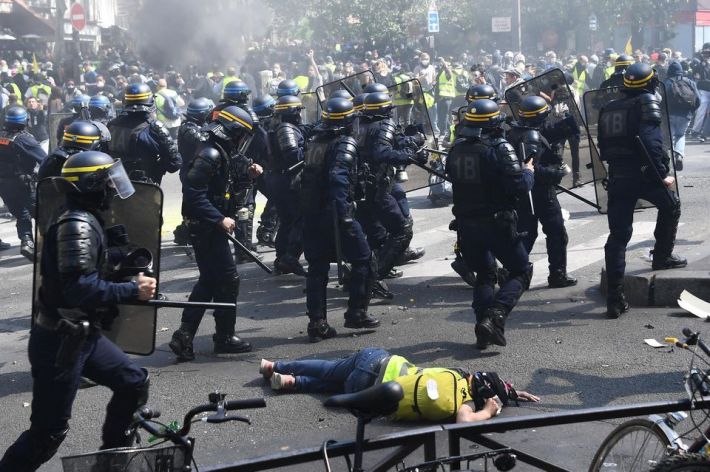
If we want to understand where the liberal-capitalist system is today, it is well worth taking a look at France. The election of Emmanuel Macron as president was a triumph of neoliberalism, the long-awaited opportunity for the dismantling of the social structures which the French had still stubbornly hung on to, decades after Thatcher did away with them in the UK.
But, less than two years after his election success, an unprecedented revolt shook the country. The Gilets Jaunes movement broke free from the restraints on revolt carefully policed by compromised trade unions and political parties, and unleashed a massive popular uprising against the Macronist system. A year later this converged with opposition to Macron’s neoliberal pension “reforms” to result in an extraordinarily broad rejection of his agenda. For more information see the Winter Oak collection of articles on the Gilets Jaunes. (54)
As one would expect from the history of liberalism, the response of the state was twofold. Firstly, there was a physical repression of the protest movement using the full array of modern police weaponry – tear gas, water cannon, grenades – along with traditional boots and batons.
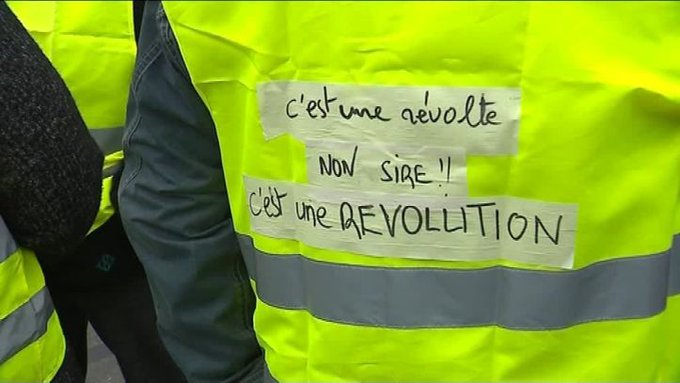
Secondly, there was a non-stop barrage of media propaganda against the Gilets Jaunes. This went beyond the usual condemnation of “violent protesters” and the laughable underestimation of crowd numbers aimed at undermining morale and momentum. The liberal intellectual elite were wheeled out to explain that the Gilets Jaunes were a bunch of reactionaries, even fascists.
When the explicitly anti-fascist presence on the demos made that hard to swallow, they were depicted as “red-browns” – the tired old liberal trope of fascism being closely related to socialism, anarchism and communism, rather than being the emergency means by which liberals defend capitalism from those same threats to their domination. Even the “anti-semitism” slur was wheeled out to try and discredit the anti-neoliberal uprising.
But perhaps what was most notable was the tone in which these attacks on the Gilets Jaunes were expressed. This was the voice of the Paris bourgeoisie and, in their fear at what was happening, they forgot to hide the accent of class contempt in their anti-GJ diatribes.
These protesters were just scum, ignorant hicks from the provinces, uncouth and unwashed peasant rabble flooding into the glittering citadel of Privilege-sur-Seine. A massive social and cultural divide in France, which had obviously been there all along, was suddenly there for all to see, in broad daylight. The effects of this revelation are likely to be of historical significance and already there has been a flood of commentary around the subject.

Philosopher Frédéric Lordon, for example, has recently stated that the arrogance of the liberal capitalist system has now reached a point where there is no longer any point in trying to force it to reform or compromise, as was possible during its previous softer phase. Lordon concludes that revolutionary insurrection is therefore now the only possible way forward. (55)
A 2019 book by left-wing journalist François Bégaudeau is of particular relevance to our argument here, because it plunges deep into the assumptions and mindset behind liberal hypocrisy.
Histoire de ta Bêtise, ‘The Story of Your Stupidity’, is addressed to an archetypal Parisian bourgeois liberal. These, he makes clear, are the people who brought Macron to power: “The Macron vote was the most purely bourgeois in the history of your republic”. (56)
Although they might paint themselves as being of the “left”, their class status meant they would always essentially be conservative. “What is it that you want to conserve? Yourself. A bourgeois is someone who possesses, who has something to lose, who has more to lose than to gain from the destruction of the existing order”. (57)

Liberals thus only criticise capitalism on the basis of reforming it, making it more acceptable or inclusive, better adapted to current circumstances. “Blind to the structure, you say that capitalism should not be eradicated, but amended. You say that it’s finance and not capitalism that must urgently be reined in. But the banks weren’t invented in 2008. Capitalism has always been financial”. (58)
For that reason, the “environmentalism” adopted by liberals will only ever be superficial and can never address the root of the problem: “Your ecological transition will not escape the framework of growth and accumulation. Your disruptions will create no rupture with finance”. (59)
Bégaudeau describes how the liberals’ main bugbear is what they call “populism”, the fake category which lumps in the radical left with the far right. Liberals try to smear all of those designated “populist” as intrinsically racist because of their working class status – as if the upper classes were exempt from this or as if their capitalist system did not perpetuate racism on a murderous global scale.
Of course, notes Bégaudeau, it is no coincidence that this great threat to liberalism comes from a term designating the people. “What is the definition of the people in your personal dictionary? That which threatens you. Threatens your place”. (60)

He adds: “Hostility to populism is the presentable mask of what Jacques Rancière calls your hatred of democracy, along with your holy terror at the thought of the beggars bursting into your lofty sphere. You like the proles in the same way as racists like Africans: back home where they belong”. (61)
Bégaudeau also points out the propaganda techniques used by liberals to smear and silence their opponents, without breaking the “democratic” spell by appearing overtly authoritarian.
One of these is the “conspiracy theory” label, which liberals use “like a pesticide” (62) against genuinely radical opponents. Anything from revelations about government ministers’ private links to the nuclear industry or Big Pharma to discussion of post-WWII US interference in European politics is written off as nothing but “conspiracy theory”, says Bégaudeau.
“You hold your nose. Anti-americanism is conspiracy theory. You don’t want to hear about the payback from the Marshall Plan”. (63)
He likewise draws attention to the supposedly “non-political” position often adopted by liberals. We might add that there is nothing new about this. Debord and his fellow Situationists refer in one analysis to a revolutionary of the 1871 Paris Commune “who, when a suspect bourgeois insisted that he had never had anything to do with politics, replied, ‘That’s precisely why I’m going to kill you’”! (64)
Bégaudeau says the bourgeois-liberal aversion to anything they deem “political” or “ideological” comes from the fact that they are not so much interested in politics as in economics.
“You are a centrist, but you don’t call yourself that. A shopkeeper doesn’t express political views, because he might lose some custom as a result. You don’t call yourself a centrist, but a moderate”. (65)

From this so-called “moderate” positioning, says Bégaudeau, comes the liberal habit of condemning the “extremism” of their opponents, as if there was something inherently wrong – excessive or unbalanced – about taking a definite position. They talk a lot about the need for “nuance” and insist that things aren’t so simple, that everything “isn’t black and white”. (66)
But, once again, this is sheer hypocrisy and cant, as liberals themselves never hesitate to take definite positions on issues close to their heart. It is only “extreme” opposition to their capitalist system that they consider out of bounds. “You can’t imagine going beyond the capitalist system, in other words the subversion of the social relationships which make you rich. You will not saw off the branch on which you are sitting”. (67)
In a magnificent confirmation of his analysis, and of ours in this article, Bégaudeau was fired from Transfuge, the journal for which he had written since its launch, by editor Vincent Jaury, because of his book. Jaury complained of Bégaudeau’s alarming “radicalisation” and claimed that Histoire de ta bêtise amounted to “a red-brown drift, a fascist impulse”. (68)
So, once again, we see the two faces of the liberal tyranny. One the one hand it sacks a journalist for challenging its system and its deceit. On the other hand it tars the offending heretic with the worst associations available from its bag of hypocritical smears.
7. Conclusions

Liberalism has for many centuries been a convenient disguise for the rule of money, the concentration of power and wealth in the hands of a small but very dominant elite. The disguise is convenient because it lulls the population into a false sense of complacency or pessimism.
“We live in a democracy, so if things don’t change it is maybe because people don’t want them to”, some conclude. “Maybe essentially, for all its faults, the capitalist world really is the only possible one and the best we can do is to tinker with the detail to make it as nice as possible. After all, the alternatives are all so much worse!”
If today it has become possible to see through the liberal lies, it is no doubt because the “nice” face of the system is rapidly disappearing as it faces the possibility of collapse. It is racking up its techniques of overt repression – from surveillance to political persecution, from blatant censorship to draconian seizures of “emergency” powers – without paying as much attention to its image as it used to. It doesn’t seem to care any more.
Writes Landa: “Liberalism, in the form of neo-liberalism, has shaken itself out of its democratic stupor, to regain its former, elitist vigour”. (69)

How would we label the current regimes in France, Chile, Brazil, Bolivia, Israel or India? Neoliberal? Neoconservative? Or what? To quote The Acorn from January 2020: “Neoliberalism is coming out of the closet and revealing itself to be a 21st century form of fascism”. (70)
So what does that this mean for the opposition to capitalism – the real opposition that is, rather than the controlled variety?
In some ways, of course, the explicitly authoritarian drift of the system makes it easier to identify for what it is.
But, at the same time, if we are to defeat the liberal tyranny on a long-term basis, we need to grasp not only its inherent violence, but the way in which its web of deceit hides that violence and projects it on to its enemies.
Opponents of liberalism and the capitalism it protects therefore need to spread awareness of the various points explored above, such as that:
* Work, property and “The Economy” are all concepts designed to enforce participation in the capitalist system, which serves to further enrich the rich.
* The use of the term “progress” to describe the intensification of industrial capitalism is deceitful, being deliberately conflated with the idea of social progress in order to depict opposition as “reactionary”.
* Liberal democracy is a lie. It is carefully constructed to prevent any actual threat to capitalist wealth and property. At times of crisis, when the usual defences are failing, liberals will jettison the democratic facade and resort to sheer violence.
* Words like “freedom” and “liberation” are purposefully misused by liberals so as to hide the reality of their militarist mercantile imperialism.
* Fascism was not left-wing, anti-capitalist or green. Liberalism is not a bulwark against fascism. Liberals hide their ideological proximity to historical fascism and use the “fascist” label to attack opponents of their authoritarian capitalist system.
* Liberal capitalists have created a toolbox of smears to discredit and disqualify their opponents, including “populism”, “extremism” and their all-purpose “conspiracy theory” accusation. Anti-capitalists should not fall for this manipulation or use the language of our oppressors.

We authentic radicals need, in fact, to roll back all the layers of liberal-compromised fake radicalism that have accumulated over the centuries in order to rediscover the age-old revolutionary Cause that inspired Gerrard Winstanley and the other radicals of the English Revolution.
We need, like them, to declare loudly and proudly our opposition to the tyranny of wealth, to the feudal-turned-mercantile society which steals our land and keeps us in chains for the profit of the rich.
We need to pick up from where our rebel ancestors left off, to continue to fight for their vision of a society free of classes, of property, law, authority and exploitation, a society in which all of us are recognised as equally-loved children of nature.
As Winstanley declared: “The poorest man hath as true a title and just right to the land as the richest man. True freedom lies in the free enjoyment of the earth”. (71)
 1. Gerrard Winstanley, The True Levellers Standard Advanced (1649).
1. Gerrard Winstanley, The True Levellers Standard Advanced (1649).
2. A.L. Morton, A People’s History of England (London: Lawrence and Wishart, 1995), p. 217.
3. Christopher Hill, The Century of Revolution 1603-1714 (London: Sphere, 1969), p. 263.
4. Ferdinand Tönnies, Community and Society: Gemeinschaft und Gesellschaft, trad. Charles P. Loomis (New York: Dover Publications, 2002), p. 202.
5. Georges Lapierre, être ouragans: écrits de la dissidence (Montreuil: L’insomniaque, 2015), p. 206.
6. Lapierre, être ouragans, p. 381.
7. Lapierre, être ouragans, p. 392.
8. Ishay Landa, The Apprentice’s Sorcerer: Liberal Tradition and Fascism (Chicago: Haymarket Books, 2012).
9. Tönnies, p. 202.
10. Landa, p. 9.
11. John Locke, The Reasonableness of Christianity As Delivered in the Scriptures (London, 1824), p. 146, cit. Landa p. 27.
12. Landa, p. 46.
13. Landa p. 70.
14. Landa, pp. 117-18.
15. Landa, p. 72.
16. John Weiss, The Fascist Tradition. Radical Right-Wing Extremism in Modern Europe (New York: Harper & Row, 1967), p. 105, cit. Landa, p. 72.
17. Landa, p. 72.
18. Henry Ashby Turner, German Big Business and the Rise of Hitler (New York, Oxford: Oxford University Press, 1987), p. 76, cit. Landa, p. 77.
19. Adolf Hitler, speech, cit. Landa, p. 81.
20. Adolf Hitler, Mein Kampf (New York: Reynal & Hitchcock, 1941), p. 188-89, cit. Landa, p. 88-89.
21. Edouard Calic, Ohne Maske. Hitler-Breiting Geheimsprache 1931 (Frankfurt am Main: Societäts-Verlag, 1968), p. 109, cit. Landa, p. 93.
22. Landa, p. 92.
23. Ludwig von Mises, Liberalism in the Classical Tradition (San Francisco: Cobden Press, 2002), p. 51, cit. Landa, p. 237.
24. F.A. Hayek, Interview in El Mercurio, Chile, 1981, cit. Landa, p. 238.
25. Landa, p. 115.
26. Landa, pp. 115-16.
27. Landa, p. 116.
28. Landa, p. 187.
29. George Mosse, ‘Fascism and the French Revolution’, Journal of Contemporary History 31 (1989), p. 20, cit. Landa, p. 221.
30. Landa, p. 222.
31. Janet Biehl & Peter Staudenmaier, ‘Ecofascism: Lessons from the German Experience’, https://theanarchistlibrary.org/library/janet-biehl-and-peter-staudenmaier-ecofascism-lessons-from-the-german-experience
32. Henry Picker, Hitlers Tischgespräche im Führehauptquartier (Munich: Propyläen, 2003), p. 233, cit. Landa, p. 83.
33. ‘Bringing down the fascist machine’. https://orgrad.wordpress.com/articles/bringing-down-the-fascist-machine/
34. Paul Cudenec, ‘The Politics of Fear: Terrorism and State Control’, Antibodies, Anarchangels and other essays (Sussex: Winter Oak, 2013), pp.73-98.
35. Guy Debord, La société du spectacle (Paris: Gallimard, 1992), p. 152.
36. Debord, La société du spectacle, p. 25.
37. Guy Debord, Commentaires sur la société du spectacle (Paris: Gallimard, 1992), p. 38.
38. George Orwell, Nineteen Eighty-Four (New York: Signet, 1950), pp. 52-53.
39. https://wikipedia.fivefilters.org/.
40. https://www.youtube.com/watch?v=pgw6FoFPhjo.
41. https://www.republik.ch/2020/01/31/nils-melzer-about-wikileaks-founder-julian-assange.
42.
https://www.craigmurray.org.uk/archives/2020/02/your-man-in-the-public-gallery-assange-hearing-day-1.
43. https://www.timesofisrael.com/the-scholar-who-wrote-the-definition-of-anti-semitism-says-its-been-subverted.
44. See ‘Bringing down the fascist machine‘.
45. Daniel Finn, https://www.jacobinmag.com/2018/04/jeremy-corbyn-antisemitism-labour-party.
46. https://winteroak.org.uk/2016/01/11/the-acorn-20/#4.
47. https://twitter.com/WinterOakPress/status/1232789997474000897.
48. https://twitter.com/Freedom_Paper/status/1214139344925200384.
49. https://policespiesoutoflives.org.uk.
50. https://winteroak.org.uk/climate-capitalists.
51. https://rebellion.earth/event/beyond-politics-parliament-square.
52.
https://winteroakextra.wordpress.com/2016/01/19/quote-for-the-day-january-19.
53. https://en.wikipedia.org/wiki/Change_UK.
54. https://winteroak.org.uk/the-gilets-jaunes.
55. https://blogs.mediapart.fr/jean-marc-b/blog/241119/f-lordon-une-seule-solution-insurrection-revolutionaire.
56. François Bégaudeau, Histoire de ta bêtise (Paris: Pauvert, 2019), p. 38.
57. Bégaudeau, p. 44.
58. Bégaudeau, p. 160.
59. Bégaudeau, p. 44.
60. Bégaudeau, p. 33.
61. Bégaudeau, p. 34.
62. Bégaudeau, pp.28-29.
63. Ibid.
64. Guy Debord, Attila Kotányi & Raoul Vaneigem, ‘Theses on the Paris Commune’ (1962). https://www.cddc.vt.edu/sionline/si/commune.html.
65. Bégaudeau, p. 174.
66. Bégaudeau, p. 183.
67. Bégaudeau, p. 182.
68. https://begaudeau.info/2019/03/24/ta-betise-sans-fin.
69. Landa, pp. 174-75.
70. https://winteroak.org.uk/2020/01/21/the-acorn-54/#4.
71. Gerrard Winstanley, The Law of Freedom (1652).